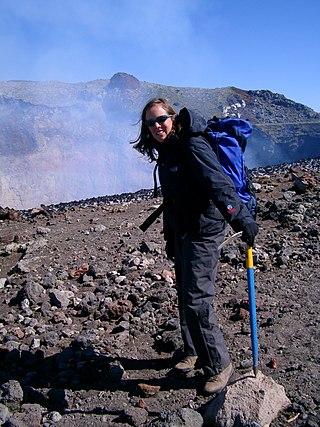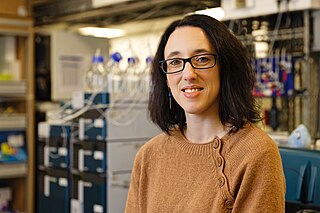
The Max Planck Institute for Chemistry is a non-university research institute under the auspices of the Max Planck Society in Mainz, Germany. It was created as the Kaiser Wilhelm Institute for Chemistry in 1911 in Berlin.
Melissa G. Trainer is an American astrobiologist who in 2004 demonstrated empirically that life could have formed on Earth through the interaction of methane, carbon dioxide and ultraviolet light (sunlight). She is Assistant Chief for Science, Operations, and Strategic Planning in the Planetary Environments Laboratory at NASA's Goddard Space Flight Center.

Susan Solomon is an American atmospheric chemist, working for most of her career at the National Oceanic and Atmospheric Administration (NOAA). In 2011, Solomon joined the faculty at the Massachusetts Institute of Technology, where she serves as the Ellen Swallow Richards Professor of Atmospheric Chemistry & Climate Science. Solomon, with her colleagues, was the first to propose the chlorofluorocarbon free radical reaction mechanism that is the cause of the Antarctic ozone hole. Her most recent book, Solvable: how we healed the earth, and how we can do it again (2024) focuses on solutions to current problems, as do books by data scientist Hannah Ritchie, marine biologist, Ayana Elizabeth Johnson and climate scientist Katharine Hayhoe.

Tamsin Alice Mather is a British Professor of Earth Sciences at the Department of Earth Sciences, University of Oxford and a Fellow of University College, Oxford. She studies volcanic processes and their impacts on the Earth's environment and has appeared on the television and radio.
Kimberly A. Prather is an American atmospheric chemist. She is a distinguished chair in atmospheric chemistry and a distinguished professor at the Scripps Institution of Oceanography and department of chemistry and biochemistry at UC San Diego. Her work focuses on how humans are influencing the atmosphere and climate. In 2019, she was elected a member of the National Academy of Engineering for technologies that transformed understanding of aerosols and their impacts on air quality, climate, and human health. In 2020, she was elected as a member of the National Academy of Sciences. She is also an elected Fellow of the American Philosophical Society, American Geophysical Union, the American Association for the Advancement of Science, American Philosophical Society, and the American Academy of Arts and Sciences.
Arlene M. Fiore is an atmospheric chemist whose research focuses on issues surrounding air quality and climate change.
Kristie Ann Boering is a Professor of Earth and Planetary Science and the Lieselotte and David Templeton Professor of Chemistry at University of California, Berkeley. She studies atmospheric chemistry and mass transport in the extraterrestrial atmosphere using kinetics and photochemistry. Boering was elected a member of the National Academy of Sciences in 2018.
Sonia Maria Kreidenweis is an American Professor of Atmospheric Sciences at Colorado State University. Her research considers aerosols and their impact on weather and the climate. She has previously served as President of the American Association for Aerosol Research and was a board member of the American Meteorological Society. She was elected a Fellow of the American Geophysical Union in 2019.
Emily V. Fischer is an atmospheric chemist and an associate professor in the department of atmospheric science at Colorado State University. She earned notoriety from her work on the WE-CAN project and on PAN, specifically its role in changing the distribution of oxidants in the troposphere. She has received many honors including the prestigious James B. Macelwane Medal which is "given annually to three to five early career scientists in recognition of their significant contributions to Earth and space science." Fischer is also a role model and activist in galvanizing support for women in STEM fields.
Meredith G. Hastings is an American atmospheric chemist and a professor of earth, environmental, and planetary sciences at Brown University. Her research focuses on the reactive nitrogen cycle and how atmospheric chemistry affects climate. She is also the founder and president of the Earth Science Women's Network (ESWN).
Lynn Russell is a professor of atmospheric chemistry at the Scripps Institute of Oceanography a division of the University of California, San Diego in La Jolla, California.

Julia Yvonne Schmale is a German environmental scientist. She is a specialist in the micro-physical makeup of the atmosphere, in particular aerosols and their interaction with clouds. She is a professor at EPFL and the head of the Extreme Environments Research Laboratory (EERL). She is a participant in the Multidisciplinary drifting Observatory for the Study of Arctic Climate (MOSAiC) expeditions.
Joyce Penner is an atmospheric scientist known for her research on climate change, especially on the impact of aerosols and clouds.
Patricia K. Quinn is an atmospheric chemist working at the National Oceanic and Atmospheric Agency's Pacific Marine Environmental Lab. She is known for her work on the impact of atmospheric aerosol particles on air quality and climate.

Ulrike Lohmann is a climate researcher and professor for atmospheric physics at the ETH Zurich. She is known for her research on aerosol particles in clouds.
Trude Storelvmo is a Norwegian meteorologist who is a professor at the University of Oslo. She specializes in atmospheric science and studies the impact of aerosols and clouds on the climate of the Earth. She was awarded a European Research Council Starting Grant in 2018. She serves as editor-in-chief of Global and Planetary Change.
Vivian Faye McNeill is an American atmospheric chemist who is professor of chemical engineering at Columbia University. She leads the University's initiative Clean Air Toolbox for Cities. McNeill provided expert guidance on aerosols and ventilation throughout the COVID-19 pandemic.

Delphine Farmer is a Canadian chemist who is a professor at the Colorado State University. Her research considers the development of scientific instruments for atmospheric science. She was awarded the American Geophysical Union Atmospheric Sciences Ascent Award in 2022.

Chiara Giorio is an Italian atmospheric chemist who is an Assistant Professor in the Yusuf Hamied Department of Chemistry at the University of Cambridge, a Fellow of Christ's College and a Fellow of the Community for Analytical Measurement Science.
Nga Lee Ng is the Love Family Professor at the Georgia Institute of Technology, holding appointments in both the School of Chemical and Biomolecular Engineering and the School of Earth and Atmospheric Sciences. Her research focuses on atmospheric chemistry, particularly in the study of organic aerosols and their effects on air quality, climate, and human health.







